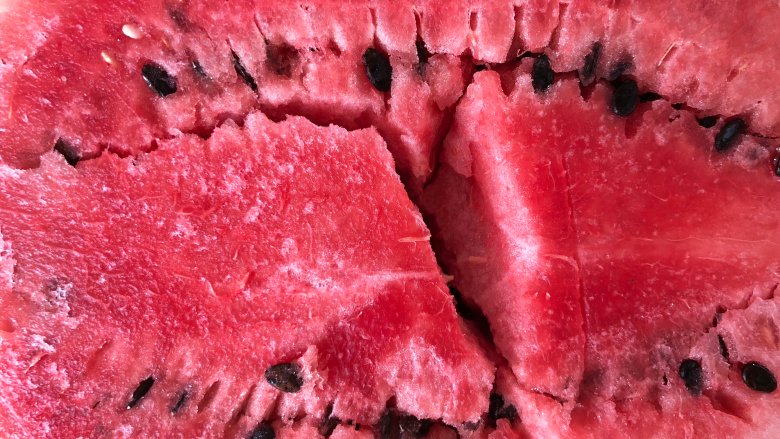The False Watermelon Fact You Always Thought Was True
There are a lot of claims floating around the Internet, and it seems that for every statement made on just about any topic, you can also find a statement that claims the exact opposite to be true, even when that subject is something as innocuous as watermelon.
No, we're not talking about the old wives' tale that swallowing a watermelon seed will guarantee one grows in your belly (which, just to be crystal clear, is total bunk) — we're talking about the belief that if you cut into a watermelon and discover the flesh has a gaping crack in the middle, you've got to toss that baby out because it's full of harmful chemicals you definitely don't want in your body.
First, let's begin with where this rumor got its start: Back in 2011, reports of exploding watermelons in China hit the news. The cause, it was discovered, was impatient farmers overdosing their crops with the growth accelerator forchlorfenuron. The growth chemical, combined with wet weather, put those melons into overdrive, and suddenly those impatient farmers had nothing but acre after acre of burst fruit on their hands. At the time, CBS News said that an investigative report by China Central Television emphasized "how farmers in China are abusing both legal and illegal chemicals" — forchlorfenuron being a legal chemical in the country.
And it turns out forchlorfenuron is legal in the U.S., too, but not for use in watermelons. According to Snopes, the plant growth regulator was approved for use on kiwifruit and grapes in 2004 and is applied only once. Per the EPA pesticide fact sheet, forchlorfenuron "improves fruit size, fruit set, cluster weight and cold storage" in those fruits. So, it makes some sense as to why Chinese farmers hoping for massive melons in a hurry would use the chemical, but it's not being used in watermelons in the U.S.
So what does exploding fruit caused by misuse of forchlorfenuron in Asia have to do with those cracks in watermelons? Well, the belief is that if the flesh of your melon has a crack, it's an indicator that the growth accelerator has been used, causing it to grow too quickly to even keep up with itself, resulting in that internal fissure. Maybe that would be true if you were buying your watermelon in China, but here in the U.S. it's likely there's a far less nefarious reason for that rupture.
Cracks in the flesh of watermelons that aren't pumped full of forchlorfenuron are actually caused by hollow heart disorder, and it's nothing to fear. Though hollow heart in watermelons was once believed to be a caused by rapid growth due to excess nitrogen, over-watering, and favorable growing conditions that prompted the rind to expand faster than the flesh inside, a 2014 study by University of Delaware researcher Gordon Johnson, Cooperative Extension fruit and vegetables specialist and assistant professor in the Department of Plant and Soil Sciences, showed that the fruit's distance from its pollen source is actually to blame.
Watermelons that were further from their pollinizers had a higher likelihood of hollow heart, and bad weather early in the growing season only increased that risk. "It occurs in poor weather conditions, and oftentimes in the early watermelons," Johnson said. "That's because we're more likely to have cold nights or stormy conditions, particularly cold nights, where those early flowers are the most affected." With inadequate pollination, he explained, "there is reduced release of the plant hormone that controls the development of storage tissue leading to hollow heart." And since there isn't a quick fix for hollow heart disorder, like pesticides or fertilizers, chances are good that you'll cut into a watermelon with hollow heart at some point during the year, especially in those early season melons.
Bottom line? Watermelons with hollow heart might not make for the prettiest slices, and you might not get the ideal Instagram-worthy shot out of one, but according to Gardening Know How, they're perfectly safe to eat. That's because hollow heart isn't actually a disease of the fruit, but a "failure in the seed production process," and it's actually this failure (and the concentration of sugar it causes) that, some say, make the flesh even sweeter. Almost makes you hope for a watermelon with hollow heart now, doesn't it?
